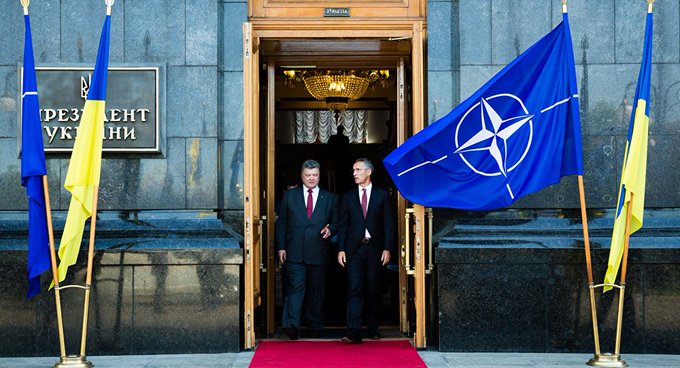In a recent article, “Russia Increasingly Treats Georgia As Its Prospective Satellite,” Vasili Rukhadze, political analyst at the Jamestown Foundation, writes that Georgia has recently experienced a “heightened level of Russian intimidation.” He details recent incidents, including an attempt by the Night Wolves, a nationalist Russian motorcycle club, to enter Georgia to celebrate May 9 Victory Day over Nazi Germany and a visit to Georgia by Yuri Luzhkov, former mayor of Moscow and open supporter of Georgia’s Russian-dominated, secessionist enclaves of Abkhazia and South Ossetia. Mr. Rukhadze though does not go as far as to draw the logical conclusion from these incidents.
 |
| Vladimir Putin riding with e Night Wolves during his election campaign |
As a former constituent state of the Soviet Union, Georgia is strategically important.
Even tiny Montenegro in Central Europe was not so easily destabilised last year when Russian and Serbian citizens believed to be directed by Moscow failed to carry off an attempted coup.
Putin may believe, as he searches for a casus belli that Georgia is the perfect opportunity. International condemnation of Russia’s invasion of Georgia in 2008 was a slap on the wrist, and Putin may believe that he can pull it off again since he has very little to lose.
And the prize is worth the taking. As a former constituent state of the Soviet Union, Georgia is strategically important. Control of Georgia would extend Russian authority south over more of the Black Sea coast. It borders on Turkey and, together with a pro-Moscow leaning Armenia, is the most direct transport corridor with Iran—countries Russia has prioritised for improved relations. Georgia also sits astride major east-west oil and gas transport routes. It even offers greater control of the Caucasus region by allowing Moscow to effectively encircle the Muslim oblasts in the North Caucasus.

Russia already controls two puppet states on occupied Georgian territory
Recent provocations in the Russian-controlled Abakhazia and South Ossetia enclaves themselves suggest a tightening of Moscow’s screws on Georgia, including the recent announcement of the creation of joint Abakhazia-Russian military units and the planned merger of law enforcement bodies, as well as rumors that Russia may seek to absorb the enclaves as it did with Crimea.
Recent Russian provocations in Georgia are tangible reminders that Moscow has not given up its interest in the region. Provocations there and elsewhere suggest that Russia remains active and capable of surprising acts of covert and overt aggression.
Top US think tank says @NATO must swallow up #Georgia, #Macedonia, #Bosnia & #Ukraine https://sptnkne.ws/ez3E
Twitter post by Russia’s Sputnik. Russian misinformation often accuses others of conduct Russia itself engages in.
If Russian provocations in Georgia continue or escalate over the next few months, if Russian media escalates its criticisms and attacks on Georgia’s government or its interests—such as this from Sputnik—and, if Russia’s designs on the two enclaves advances toward absorbing them into the Russian Federation, then it is prudent to ask how far Putin might go, which will depend on his assessment of how vulnerable Georgia is, how the West might respond, and on how desperate Putin is to achieve an overwhelming electoral victory next year.
So far, Putin has not found his opportunity. It may be too early yet. The 2018 election is still months off. In the meantime, Georgia needs to be alert and counter Russian misinformation when it occurs. The recent agreement between Georgia and the US on intelligence sharing is a useful step to counter Russian misinformation, which is the first step in any escalation by Russia. Also, useful is the draft US 2017 federal budget that proposes “not less than $100m” to counter Russian influence and aggression in Europe, Eurasia and Central Asia, including Georgia, through support for rule of law, media, cyber, and other programs as well as support for internet freedom in the Russian Federation.
In order not to allow Russia to benefit from aggression, Georgia needs sustained diplomatic, financial and civil society support. Mr. Rukhadze has it right. Without Georgia’s steadfastness, and without international support, Georgia risks becoming a Russian satellite.
Euromaidan Press
Euromaidan Press





No comments:
Post a Comment